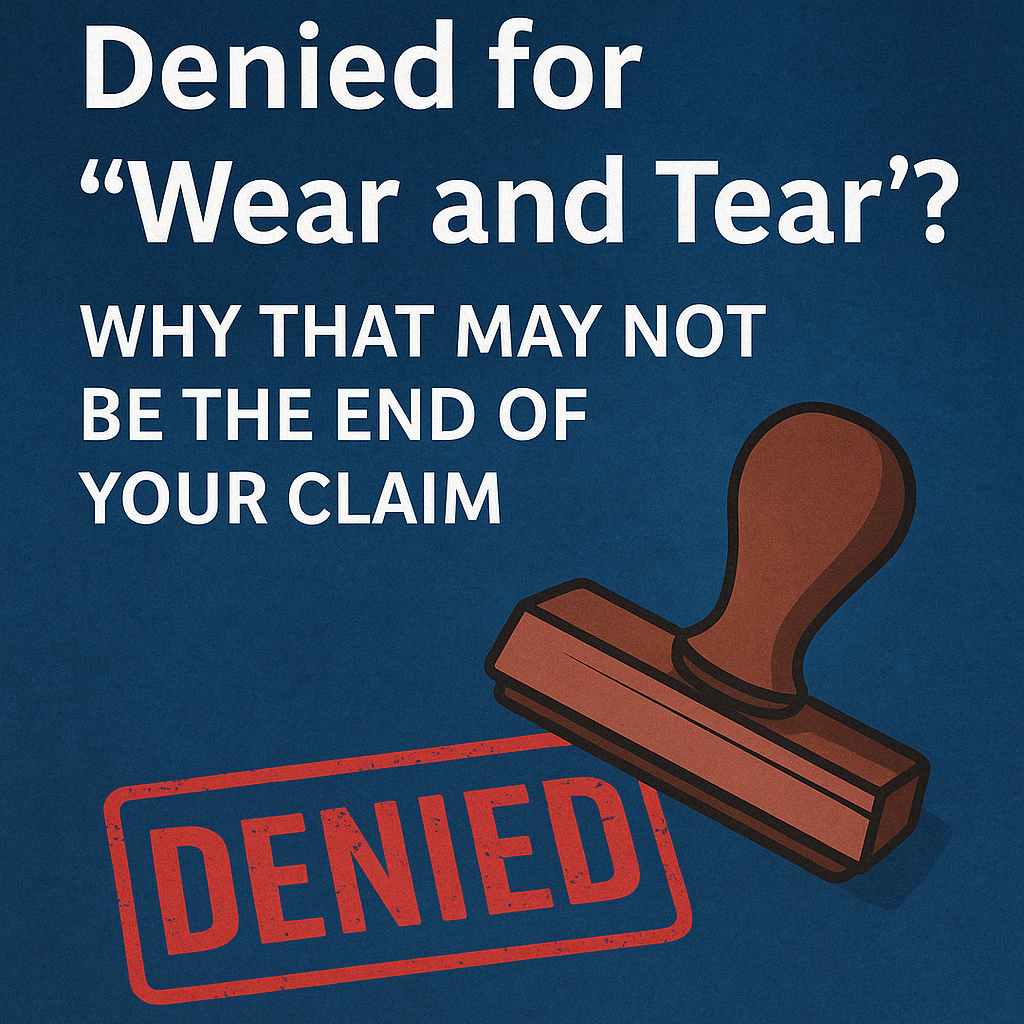Tennessee Homeowners: Don’t Let Your Insurance Company Get Away With a Bad Denial
You’ve paid your premiums for years. Now your home is damaged, and you’ve done everything right—but the insurance company says the damage isn’t covered because it’s “just wear and tear.” This is one of the most common reasons insurers use to deny legitimate claims in Tennessee.
Here’s what you need to know:
Just because the insurance company says it’s wear and tear doesn’t mean they’re right — and it doesn’t mean they’ve honored their contract.
🔎 What Does “Wear and Tear” Mean in an Insurance Policy?
“Wear and tear” is typically listed in homeowners’ policies as an excluded cause of loss, referring to damage that happens gradually due to age, normal use, or lack of maintenance. But insurers often use this language too broadly to avoid paying for damage that should be covered.
Examples of valid wear and tear exclusions:
- An aging roof deteriorating over decades
- Normal rust or corrosion on pipes
- Paint fading or cracking due to sun exposure
The key issue is when the damage is sudden — not gradual.
⚠️ Here’s How Insurance Companies Misuse the “Wear and Tear” Excuse
The insurance company may conduct a surface-level inspection and quickly conclude your damage was due to age or deterioration — even when the actual cause was sudden, accidental, and covered under your policy.
Common examples in Tennessee:
- A pipe bursts and floods your home, but the adjuster blames long-term corrosion.
- Wind blows shingles off your roof, but they say the roof was old and not properly maintained.
- A dishwasher suddenly leaks and destroys your floors, but they deny the claim because the gasket was worn.
These denials often misapply the policy language, and in many cases, violate the contract you have with your insurer.
⚖️ Breach of Contract: Your Strongest Legal Weapon
Under Tennessee law, you have the right to file a breach of contract lawsuit if your insurance company refuses to pay a valid claim. Unlike bad faith—which can be hard to prove due to Tennessee’s high standard—breach of contract is often the clearest and most direct path to recovery.
To win a breach of contract case, you must show:
- You had a valid insurance policy
- You suffered a covered loss
- The insurance company failed to pay what it owed under the terms of that policy
You do not have to prove the insurer acted with ill intent — only that it failed to live up to its contractual obligations.
⚡ But What About Bad Faith?
Tennessee does allow policyholders to bring bad faith claims under T.C.A. § 56-7-105, but the requirements are strict. You must prove:
- The claim was denied in bad faith, and
- You provided written demand for payment at least 60 days before filing suit
If successful, you may recover:
- The amount owed under the policy
- A penalty of up to 25% of the loss
- Possibly attorneys’ fees
However, most cases are won (or settled) on breach of contract grounds. Bad faith is a potential add-on in egregious cases — not the foundation.
🛠️ Your Claim May Still Be Covered — Even If Wear and Tear Is Involved
Even if part of the issue was wear and tear, Tennessee law often requires insurers to cover the resulting damage. This is known as the “ensuing loss” rule.
Example: A corroded pipe bursts and floods your hardwood floors. The pipe itself may not be covered, but the water damage to the floors, baseboards, and walls may be.
Insurance companies often ignore this — but courts do not.
✅ What to Do If You’ve Been Denied
If your insurer denied your claim due to “wear and tear,” here are steps you should take:
- Get the denial in writing. Ask for the specific policy language they relied on.
- Request the adjuster’s report. Look for inconsistencies or lack of a proper inspection.
- Document the damage. Photos, videos, repair estimates, and any plumbing or contractor reports can help.
- Consult with an insurance attorney. Don’t try to fight this battle alone — especially when the insurer is bending or misapplying the rules.
🏛️ Final Thought: Your Policy Is a Contract — Hold Them to It
Your insurance policy is a legally binding contract. When the insurer denies a valid claim under the vague label of “wear and tear,” they may be in breach of that contract.
At The Insurance Law Firm, we help homeowners and property owners across Tennessee stand up to these tactics. We pursue breach of contract claims to get you the compensation you’re owed — and when appropriate, we push for bad faith penalties too.
If your insurance company denied your claim for “wear and tear,” call us today. Your claim might still be worth thousands — and you don’t have to fight the insurance company alone.




